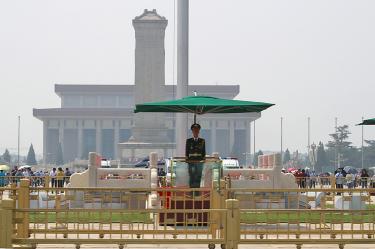Beijing yesterday marked 30 years since the Tiananmen Square Massacre with a wall of silence and extra security.
Police checked the identification cards of every tourist and commuter leaving the subway near Tiananmen Square, the site of the pro-democracy protests that were brutally extinguished by tanks and soldiers on June 3 and 4, 1989.
Foreign journalists were not allowed onto the square at all or warned by police not to take pictures.
Officials told one reporter that “illegal media behavior” could affect visa renewals.
Meanwhile, Washington marked the occasion by hailing the “heroic” movement of 1989.
The Chinese Communist Party detained several pro-democracy advocates in the run-up to yesterday, while popular livestreaming sites conspicuously shut down for “technical” maintenance.
Searches for the term “Tiananmen” on the Sina Weibo platform yesterday displayed the official logo of the 70th anniversary of the founding of communist China.
Over the years, the party has censored any discussion of the protests and crackdown, which left hundreds, possibly more than 1,000 people, dead — ensuring that people either never learn about what happened or fear to discuss it.
The party and its high-tech police apparatus have tightened control over civil society since Chinese President Xi Jinping (習近平) took office, rounding up pro-democracy advocates, rights lawyers and even Marxist students who sympathized with labor movements.
Countless surveillance cameras are perched on lampposts in and around Tiananmen Square.
“It’s not that we don’t care. We know what happened,” said a Didi Chuxing driver. “But how can I tell you when the DiDi Chuxing app is recording our conversation?”
“Today’s China has changed,” he added. “If you have money, you have everything. Without money, you dare not open your mouth.”
It was largely business as usual at Tiananmen yesterday: Hundreds of people, including children waving small Chinese flags while sitting on their parents’ shoulders, lined up to watch the daily flag-raising.
However, the line moved slowly due to extra security, with identification cards matched on facial recognition screens.
When asked whether it occurred to her that she was visiting the square on the 30th anniversary of the Tiananmen Square Massacre, a nursing school graduate in her 20s from eastern Shandong Province said: “What do you mean? No, it didn’t cross my mind.”
Her mother added: “We don’t think of that past.”
Source: Taipei Times - 2019/06/05





















